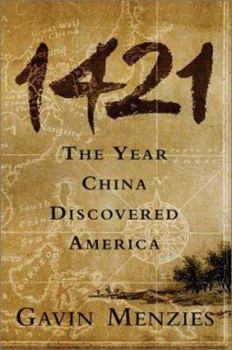1421: The Year China Discovered America
Select Format
Select Condition 
Book Overview
On March 8, 1421, the largest fleet the world had ever seen set sail from China to proceed all the way to the ends of the earth to collect tribute from the barbarians beyond the seas. When the fleet... This description may be from another edition of this product.
Format:Hardcover
Language:English
ISBN:0060537639
ISBN13:9780060537630
Release Date:January 2003
Publisher:William Morrow & Company
Length:576 Pages
Weight:2.29 lbs.
Dimensions:1.6" x 6.1" x 9.3"
Customer Reviews
6 ratings
1421 to Fusang!!
Published by walter Ko , 5 years ago
Gavin writes this book to point out the year China discovered America with support of evidence. It is from his perspective as a former submarine commander, not a historian nor scholar, and it rocks the boat of classic notion that Columbus discovered America myth. He was attacked by intellectual thugs but he keeps on his endeavor in this aspect, especially with the book: Who Discovered America?
It is wonderful to check out the Oracle Bone writing of Shang Dynasty on many Native American rock arts and I witnessed many. Native Americans claimed Hopi and many other tribes met the two representatives from Chinese emperor Greater Yu to survey the world!
This book is a good orientation to that research. Enjoy!
I still have not received this book !!
Published by Thriftbooks.com User , 6 years ago
Challenging opinions.
Published by Thriftbooks.com User , 18 years ago
This book explores the talents of the Chinese, a nation that for many years has been hidden. Few books are written about China's history, but Gavin has pieced together the events of China discovery and exploration of the world. No doubt this book will challenge many people's ideas about early exploration, but at the the same time enough facts are given to substiantiate this tremendous effort of discovery. This is a well written book that is easy to read, but could benefit from additional charts and explanations.
Menzies makes sense
Published by Thriftbooks.com User , 20 years ago
Menzies has brought a common sense (or in this case a Navigator's sense)to re-examine the widely accepted belief that Columbus discovered America.In a well reasoned and well written book, he asks questions which are pertinent to the foundations of that belief. In so doing, he follows the footsteps of Thor Heyerdahl and Tim Severin in showing that it is possible that factual history may differ from interpreted history. Was Columbus the first to discover America? We already know that the Vikings got to one part of America long before Columbus; so is it possible, as Menzies suggests, that Columbus was yoyaging to a destination already know to him rather than into the unknown?. Menzies may not (yet) have proven his case, but he raises questions that are not so easy to answer. If nothing else, his book is fascinating in providing answers which make a great deal of professional sense.
Required reading for all history buffs
Published by Thriftbooks.com User , 20 years ago
This is a great book for many reasons. First, it is a great adventure story. The author takes the reader along the voyages of China's great treasure fleets in the 1420s as they sailed around the world. Second, it clearly illustrates how history depends on who is around to tell it, and not on the truth. Third, it is a great detective story. The author shows how different clues have to be pieced together to create a coherent story. And last, it is a perfect example of how achievements are easily forgotten or erased from memory. The flow of the text is good; there are enough references in the text to keep it honest, but not so much as to break up the reading. The only reason I did not give this book 5 stars is that there should be more pictures and diagrams explaining the various sailing and navigation terms; like how latitude is measured via stars, how a ship sails into the wind, how distance is measured on a sailing vessel, etc...
An open mind is a terrible thing to waste.
Published by Thriftbooks.com User , 21 years ago
One of the problems I see in the attacks on Gavin Menzies work is that they are full of accusations and easy labels (e.g. "pop history"), without any refutation of the facts and reasoning made in the book. To the "reader" who wrote the first review: It's easy to level accusations at someone when you just don't like the way he turned long-held views upside down, but can you provide specific examples in any reasonable refutation? I can be a skeptic also, but the attacks that you have made seem shrill and cynical even to me. If you are going to criticize, at least read the book first! In your "review", you wrote that the fleets were "disassembled in 1421". What?!? If you had even read the excerpt or any other history book, you would not have made that mistake. So read the book with an open mind instead of focusing on that chip on your shoulder. Instead of calling the book "pop history," there is plenty of evidence that such attacks and accusations are pop accusations.





